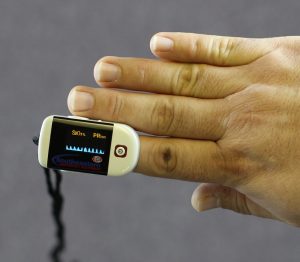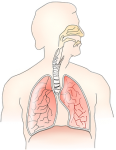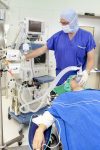
All of us have heard about Respiratory therapy and people who perform this kind of job, but not many know exactly what these professionals perform during the course of the day.
Actually, they are in charge of the assessment and treatment of patients who have either acute or chronic dysfunction of the cardiopulmonary system.
This means that respiratory therapists are a very important part of a healthcare team and its obligations are quite demanding.
So as to serve patients as much as they can, Respiratory therapists must have a broad knowledge of the pathophysiology of the cardiopulmonary system as it is up to them to properly diagnose and treat patients of all ages.
Page Navigation
Where do Respiratory Therapists Work?
Upon gaining a proper education, people tend to find a stable job which will provide them with a satisfactory salary.
The respiratory therapist’s main responsibility will be treating diseases, infections, or viruses of the cardiopulmonary system, including lung cancer, asthma, emphysema, bronchitis, and pneumonia.
So, they are in charge of patients in various facilities such as acute-care hospital settings, the emergency room, the intensive care unit, the newborn or pediatric intensive care unit, or the pulmonary diagnostics laboratory.
Also, these professionals can be found working with patients of all ages being that cardiopulmonary problems can develop in a person of every age, from premature infants with underdeveloped lungs, to senior citizens with numerous other diseases.
If they do not find a job in the hospital setting, respiratory therapists can also look for employment in pulmonary rehabilitation clinics, and their job there will be performing pulmonary rehabilitation.
Furthermore, counseling patients on topics such as smoking cessation and disease prevention can also be their job.
They can work in-home care settings where they will teach patients and their families to use assistive breathing devices.
Physician offices, long-term acute, and skilled nursing facilities, and sleep disorder centers are also places where respiratory therapists can find a job and these are just a few, meaning that they should not worry about their job prospects after reaching a degree.
The Duties of Respiratory Therapists
The main responsibilities of respiratory therapists are to diagnose lung disease and breathing disorder, and then recommend the most appropriate treatment methods for that disease and the specific patient.
During the course of the day, their job includes examining patients, performing chest exams, and analyzing tissue specimens with the aim to determine the exact disease.
So as to be able to do this, they need to have extensive knowledge of the cardiopulmonary system.
Furthermore, respiratory therapists will work with various machines and devices used to administer respiratory care treatments, meaning that they need to know how to successfully use devices.
Managing patients on ventilators and artificial airway devices, and assessing the blood-oxygen-level of patients are just some of the devices that these professionals must know how to use.
We would like to mention some of the main responsibilities of respiratory therapists:
- Managing life support mechanical ventilation systems
- Administering aerosol-based medications
- Monitoring equipment
- Analyzing blood samples
- Determining levels of oxygen and other gases
- Managing artificial airways
- Assessing lung capacity
- Analyzing chest x-rays and sputum specimens
- Assessing vital signs
- Performing tests related to the cardiopulmonary system
- Performing studies related to the cardiopulmonary system
- Conducting rehabilitation activities
- Counseling individuals in cardiopulmonary health
- Consulting with physicians and members of the medical team to recommend a change in therapy
Having in mind the fact that respiratory therapy is practiced under medical direction, respiratory therapists are a crucial part of a medical team and they can frequently be found participating in:
- The development and implementation of treatment plans and protocols
- Health promotion activities and programs
- Disease prevention
- Disease management
- Clinical decision-making
- Patient education
Entering the Respiratory Therapy Profession
Now that you know all the duties and responsibilities of respiratory therapists, you may want to enter this profession and the minimum requirement that you need to meet is to possess an associate’s degree.
This is only the starting point, as the majority of respiratory therapists tend to possess more advanced degrees, both because they get more professional opportunities as employers would rather hire a person with a higher level of education and higher pay.
So a to reach advanced degrees in respiratory care, such as bachelor’s and master’s degrees, you will have to devote more time and energy during your studies but you will be provided with additional clinical experiences and more in-depth study in respiratory care techniques, making you a more attractive candidate for employment.
No matter which degree you reach, to be allowed to work as a respiratory therapist, you must hold state licensure.
Each and every state in the U.S. requires state licensure to practice respiratory therapy, with the exception of Alaska.
The only way of getting a license is by completing a respiratory therapy education program at the associate’s or bachelor’s level that is accredited by the Commission on Accreditation for Respiratory Care (CoARC), being that candidates must earn either an entry-level Certified Respiratory Therapist—CRT credential or advanced-level Registered Respiratory Therapist—RRT credential through the National Board for Respiratory Care (NBRC) to qualify for licensure.
Licensed respiratory therapists are supposed to apply for licensure and they can maintain it according to their state’s respiratory care board requirements, which are typically realted to continuing education credits.
Characteristics of Successful Respiratory Therapists
The first characteristic of a respiratory therapist is compassion, being that emotional support provided to patients who have serious diseases is of crucial importance in the treatment of it.
Also, respiratory therapists must have problem-solving skills, so as to be able to provide the medical team with rapid and accurate assessments.
As they spend much of their time communicating with members of the medical team and patients, excellent communication skill is a must.








